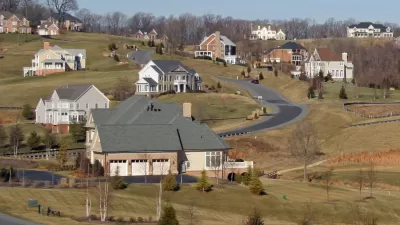Increased awareness of sprawl’s negative effects has not led to a drop-off in its construction. Developers say they only build what the market demands.

Even though we know sprawl is bad, developers are still building it in a frenzy of post-recession construction. Alana Semuels examines why large-scale suburbia is still the default residential mode.
There is a chicken-or-egg question at play here. Does buyer demand for sprawl truly drive its construction? According to this line of thinking, "studies may show that the younger generation wants small, compact, transit-accessible housing […]. But once they decide to have kids and dogs, they’ll want the traditional suburban home with more space."
Alternatively, fewer people might settle in walkable communities simply because the construction industry doesn’t provide them. The article provides examples from Las Vegas and Atlanta supporting both sides.
The public attitude toward sprawl in the 21st century "points to a growing divide about how different people think Americans want to live in the future." Regardless, there are still tangible problems associated with sprawl, including strain on taxpayers to cover the infrastructure bills for far-flung subdivisions.
FULL STORY: Why Are Developers Still Building Sprawl?

Alabama: Trump Terminates Settlements for Black Communities Harmed By Raw Sewage
Trump deemed the landmark civil rights agreement “illegal DEI and environmental justice policy.”

Study: Maui’s Plan to Convert Vacation Rentals to Long-Term Housing Could Cause Nearly $1 Billion Economic Loss
The plan would reduce visitor accommodation by 25% resulting in 1,900 jobs lost.

Planetizen Federal Action Tracker
A weekly monitor of how Trump’s orders and actions are impacting planners and planning in America.

Wind Energy on the Rise Despite Federal Policy Reversal
The Trump administration is revoking federal support for renewable energy, but demand for new projects continues unabated.

Passengers Flock to Caltrain After Electrification
The new electric trains are running faster and more reliably, leading to strong ridership growth on the Bay Area rail system.

Texas Churches Rally Behind ‘Yes in God’s Back Yard’ Legislation
Religious leaders want the state to reduce zoning regulations to streamline leasing church-owned land to housing developers.
Urban Design for Planners 1: Software Tools
This six-course series explores essential urban design concepts using open source software and equips planners with the tools they need to participate fully in the urban design process.
Planning for Universal Design
Learn the tools for implementing Universal Design in planning regulations.
Caltrans
Smith Gee Studio
Institute for Housing and Urban Development Studies (IHS)
City of Grandview
Harvard GSD Executive Education
Toledo-Lucas County Plan Commissions
Salt Lake City
NYU Wagner Graduate School of Public Service





























